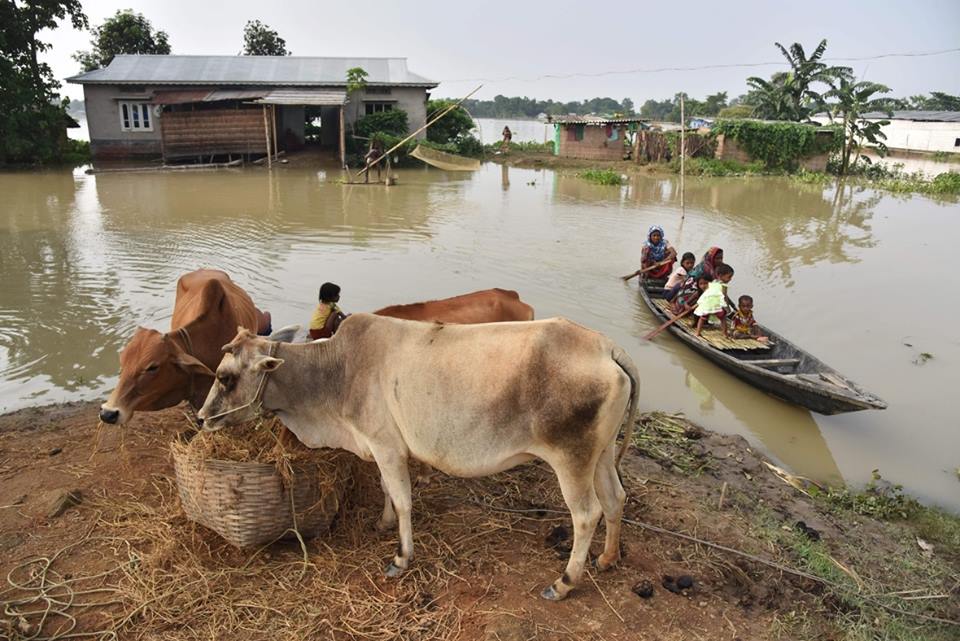The first thing that comes to mind when we talk about Eid-ul-Azha is sacrifice. After all, what is Qurbani for if not to offer sacrifices to God through the slaughter of an animal? To the believer, the sacrifice is an expression of submission to the divine will. While there are pleasures and rewards to be reaped from such an act, it is, as any pundit would remind you, not the end, but merely a means to an end—a sacrifice far greater than the ritual killing of an animal.
This is what we need to consider as we approach yet another Eid-ul-Azha, the second of the two holiest festivals in the Muslim calendar, dogged by a devastating monsoon flood. Weather events such as this have a way of creeping into people’s life at odd hours, but the timing of this year’s flood is significant.
It coincides with the Feast of the Sacrifice, effectively putting to the test our belief in sacrifice and the strength of our resolve to do what’s necessary. Before we discuss the nature and rationale of that sacrifice, here’s a quick round-up of the latest flood situation.
According to the International Federation of Red Cross and Red Crescent Societies, more than 8.1 million people in Bangladesh have been affected by what is being considered one of the worst floods the country has experienced. To date, 140 people have died and over 697,000 houses have been damaged or destroyed. In total, the floods that ravaged vast swathes of land in not just Bangladesh but also India and Nepal have affected over 16 million people.
Although water has started to recede in some places, as latest reports suggest, the victims’ troubles are far from over. With their crops washed away, houses and schools perished, no work, and their prospects of rehabilitation bleak, the victims are going to need all kinds of assistance to return to some semblance of a normal life. Whether or not they will be able to do that depends in large part on how we, those relatively unaffected by the flood, respond to the situation.
One may argue that helping the victims do not have to fall under the category of sacrifice, religiously speaking. We help someone in need precisely because that’s what we should do—one human helping another in their hour of need. And disasters like this offer us a chance to reaffirm our commitment to humanity. But that line of argument tends to ignore the reality that, in today’s increasingly individualistic society, often what’s necessary for one may be just as easily deemed irrelevant for another.
Sacrifice, for the religiously inclined, is a better motivation.
I have been following a debate for some time over whether it will be okay to use the money meant for buying sacrificial animals to help the flood victims. Sure, you can share parts of the meat among the less fortunate in your neighbourhood, one devotee said, but repurposing the money or meat for a different cause would be self-defeating. Islam has clear instructions about the ritual, he added, claiming any deviation from that will be “sinful.”
According to the Islamic jurisprudence, the sacrificial meat should be divided into three equal parts—one for the household, one for relatives and friends, and one for the poor, regardless of what faith they subscribe to. Traditionally, the festival allows for grand, indulgent feasts for the duration of four days and the division of meat makes sure everyone has a part in that.
In a normal situation, there would be no need for counterargument. But this is not a normal time, and it will not be wise either to drag a noble practice with profound social implications into an unnecessary debate. But certain confusions need to be cleared because of the potentially harmful consequences of the strong language used by the pro-tradition quarter.
Firstly, even before laying out details about meat division, Islam, in very clear terms, explained the category of individuals that must sacrifice animals. There is a difference between must and can—anyone can sacrifice, but not everyone is bound to do so. To be clear, anyone for whom it is mandatory to perform hajj must also perform qurbani, which would easily exclude a majority of the people offering animal sacrifices in a poor country like Bangladesh.
It will be then safe to say that those people, instead of treading the conventional path to sacrifice this year, can redirect part of their money or meat—even the entirety of it—to something equally uplifting: helping the flood victims, without being troubled by a religious obligation.
Secondly, even those who must perform qurbani can easily set aside part of the meat reserved for the poor and donate it for the cause, which will essentially mean the same thing as far as the objective of a sacrifice is concerned. Not to mention the bloodless sacrifices of food, medicine, and other cash or in-kind donations that can tremendously help those unfortunate men, women and children struggling to survive in the flood-hit areas.
In fact, anyone can come forward and be a part of the relief effort given the circumstances. The conservatives often tend to ignore that Islamic laws are remarkably flexible when it comes to dealing with an emergency. If extreme weather events such as a flood do not quality as emergency, I don’t know what else does.
The bottom-line is, help, in whatever guise it comes, is welcome and can be made use of at this stage. It’s important to make sure that every potential donor feels motivated to reach out instead of being cowed into inaction.











